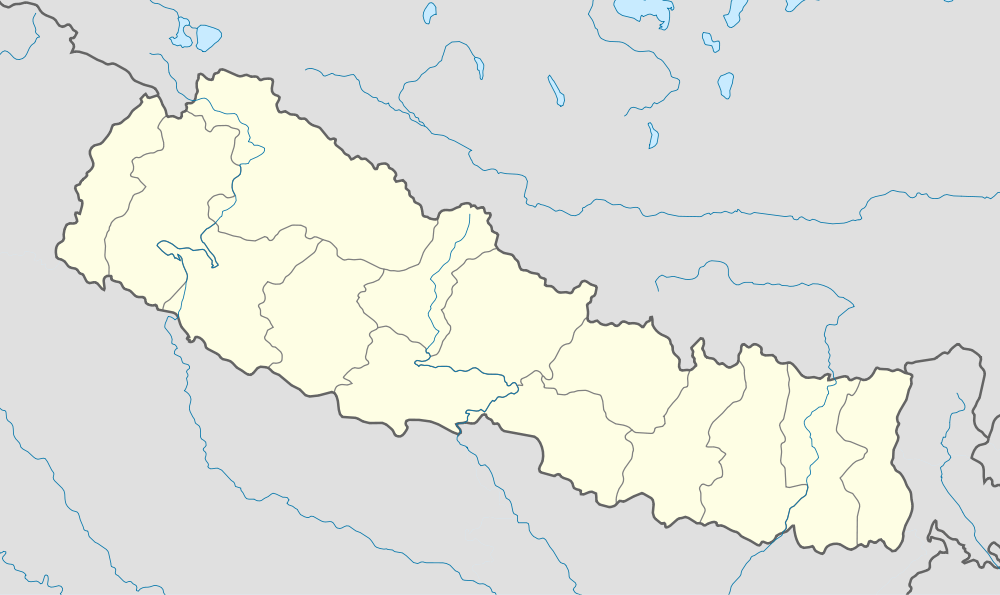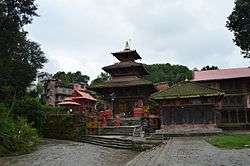Gokarneshwar
| Gokarneshwar गोकर्णेश्वर नगरपालिका | |
|---|---|
| Municipality | |
|
Gokarna Mahadev Temple | |
 Gokarneshwar Location in Nepal | |
| Coordinates: 27°44′0″N 85°23′0″E / 27.73333°N 85.38333°ECoordinates: 27°44′0″N 85°23′0″E / 27.73333°N 85.38333°E | |
| Country |
|
| Region | Central |
| Zone | Bagmati Zone |
| District | Kathmandu District |
| Established | 2014 |
| Area | |
| • Total | 58.5 km2 (22.6 sq mi) |
| Population (2011 Nepal census) | |
| • Total | 107,351 |
| • Density | 1,800/km2 (4,800/sq mi) |
| • Ethnicities | Newar, Bahun, Chhetri, Tamang, Magar |
| Time zone | NST (UTC+5:45) |
| Website |
gokarneshwormun |
Gokarneshwar is a municipality in the Central development region of Kathmandu District in the Bagmati Zone of Nepal. The new municipality was formed by merging five existing villages Sundarijal, Nayapati, Baluwa, Jorpati and Gokarna on 2 December 2014.[1][2] The office of the municipality is that of the former Jorpati village development committee.
In the village on the banks of the Bagmati River stands the Gokarna Mahadev temple, built in 1582.[3] In late August or early September people go to this temple to bathe and make offerings in honor of their fathers, living or dead, on a day called Gokarna Aunsi.[4]
The Gokarna Forest Reserve is located in the area. Southwest of Gokarna is the Nepal Medical College and Teaching Hospital.
Population
Gokarneshwar municipality has a total population of 107,351 according to 2011 Nepal census.[5] At the time of the 2011 Nepal census the village had a population of 7,508 with 1,768 households.[6]
Notable residents
Writer Ramesh Bikal was born near Gokarna in 1932.[7]
Gallery
-

-

-

Parvati Temple
References
- ↑ "Govt announces 61 municipalities". The Kathmandu Post. 3 December 2014. Retrieved 2 December 2014.
- ↑ "Govt creates 61 new municipalities". República. 3 December 2014. Retrieved 2 December 2014.
- ↑ B. Mayhew, J. Bindloss, and S. Armington (2006). Nepal. 7th Edition, Lonely Planet. ISBN 1-74059-699-4
- ↑ David Reed; James McConnachie (2002), The rough guide to Nepal, Rough Guide Travel Guides (5, illustrated ed.), Rough Guides, pp. 188, 204, ISBN 9781858288994
- ↑ "2011 Nepal census (Ward Level)" (PDF). Central Bureau of Statistics. November 2012. Retrieved November 2012. Check date values in:
|access-date=(help) - ↑ Government of Nepal, National Planning Commission Secretariat, Central Bureau of Statistics (November 2012). National Population and Housing Census 2011 (Village Development Committee/Municipality) (PDF). 02, NPHC 2011. Kathmandu. Retrieved 2014-07-10.
- ↑ Himalayan Voices: An Introduction to Modern Nepali Literature (Voices from Asia), edited and translated by Michael J. Hutt, University of California Press, 1991. p. 244. ISBN 9780520910263

